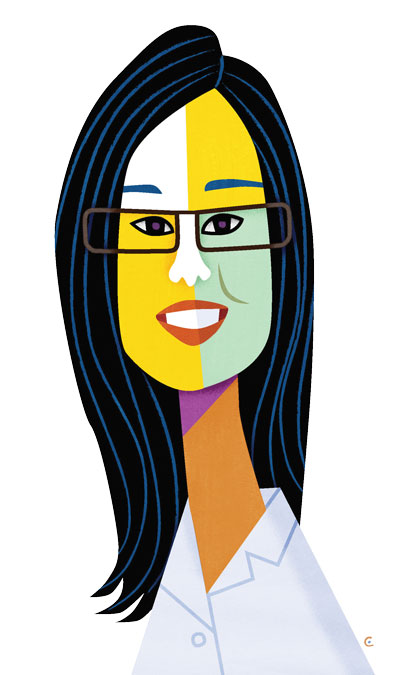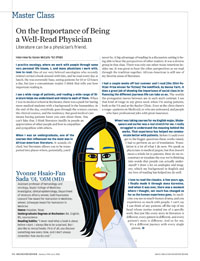Master Class
I practice oncology, where we work with people through some very personal life issues. I, and many physicians I work with, love to read. One of our very beloved oncologists who recently retired carried a book around with him, and he read every day at lunch. He was extremely busy, seeing patients for 10 or 12 hours a day, but just a consummate reader. I think that tells you how important reading is.
 (Illustration: David Cowles for Rochester Review)
(Illustration: David Cowles for Rochester Review)I see a wide range of patients, and reading a wide range of literature helps me understand and relate to each of them. When I was in medical school at Rochester, there was a push for having more medical students with a background in the humanities. At the end of the day, everybody goes through the science courses, the clinical courses, and the residency. But good medical care means having patients know you care about them. You can’t fake that. I think literature instills in people an appreciation of other people and how to empathize and sympathize with others.
When I was an undergraduate, one of the courses that influenced me the most was in African-American literature. It sounds cliched, but literature allows you to be transported into places where, potentially, you’d never be. A big advantage of reading in a discussion setting is being able to hear the perspectives of other readers. It was a diverse group in that class. There was only one other Asian American besides me. It was great to hear the other perspectives as we read through the tradition together. African-American is still one of my favorite areas of literature.
I had a couple weeks off last summer and I read [the 2014 Pulitzer Prize winner for fiction] The Goldfinch, by Donna Tartt.
Assistant professor of hematology and oncology, Baylor College of Medicine; Investigator, clinical epidemiology, Department
of Veterans Affairs; winner, Gold Foundation Leonard Tow Award for Humanism in Medicine; winner, Schweppe Award for Humanism
in Medicine
Home: Houston, Texas
Undergraduate Degrees at Rochester: BA, English; BS, neuroscience
Reading habits: “I never read what a book is about before I start. I always like to be surprised. But I also like to reread books. First of all, you discover something new every time. And I don’t always remember how stories end.”
Yvonne Hsaio-Fan Sada ’01, ’05M (MD)
When I was taking courses for my English major, Shakespeare and earlier was a real stretch for me. I really struggled to understand the meaning behind the works. That experience has helped me communicate better with patients. Before I could even get to the bigger questions these works raised, I had to perform an act of translation. Translation is a lot of what I do now. We speak as physicians in medical jargon, but that doesn’t mean a whole lot to patients. How do we reconstruct or translate the way we’re thinking into words that people can actually understand? I draw a lot on analogies and imagery, which my background in English and my love of reading has helped me do well.
I love to read the classics. A few years ago, I finally made it through Anna Karenina. And when it was over, there was a moment where I thought, not much has changed as far as the human experience goes. In medicine you see so much human drama, and you experience so much with people. I can’t say I can think of any patients off the top of my head whose stories remind me of a specific work. But just like every story in literature is different, every patient is different, and every patient’s story is different. And so for me, it’s a different journey with every single person.

